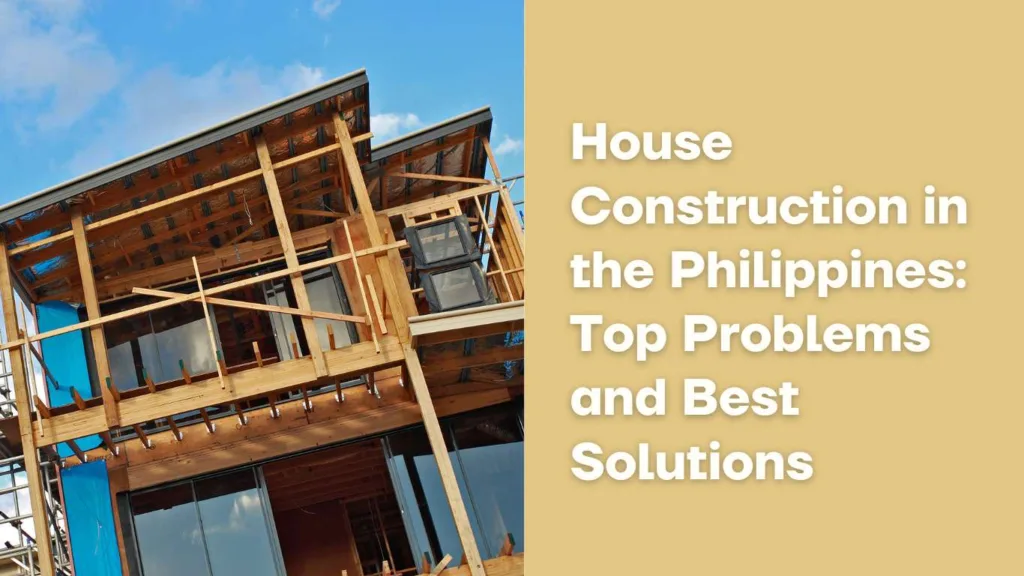New house construction or renovation in the Philippines can be a challenging task. With its unique climate, cultural context, and building regulations, there are a number of common problems that can arise during the construction process.
This blog post will explore six of the most common problems associated with house construction in the Philippines, as well as how to mitigate and solve them. Read on to get an overview of the challenges you might face when constructing a house in this beautiful country.
1. The problem of finding a good contractor
Finding a good contractor for your construction project in the Philippines is no easy task. It can be especially difficult to find a reliable house contractor who will deliver quality work on time and within budget.
Before you hire anyone, it’s important to do your research. Ask around for recommendations from people who have had positive experiences with house contractors. Look into the company’s experience and make sure they are properly licensed and insured.
Once you’ve narrowed down your choices, get detailed quotes from each potential home builder and compare them. Make sure to ask them about their project management process and timeline.
Lastly, make sure to read all contracts and agreements thoroughly before signing anything.
2. Dealing with house construction delays
If you’re building a house in the Philippines, delays are likely to be an inevitable part of the process. Construction delays are common and can often be out of your control, but it’s important to understand how to deal with them.
The first step is to understand what may be causing the delay. It could be something as simple as bad weather or difficulty in sourcing certain materials. It could also be due to problems with the contractor or their workers. Make sure to communicate regularly with your contractor and ask them for explanations if there is a delay.
Another important thing to remember is that delays don’t necessarily mean that the project has gone off track. Building a house can be a complex process and it’s normal for there to be some bumps in the road. If your house contractor is doing a good job, they will be able to give you an estimated completion date and keep you informed of any changes.
In terms of managing the delay, communication is key. If you know there will be a delay, talk to your contractor about how this will affect your budget and timeline. Be firm but also considerate – delays can be frustrating but it’s important to be patient and understanding when dealing with your contractor.
3. Managing your budget
When embarking on a house construction project in the Philippines, it is important to understand the budget of the project. It is common to underestimate how much a new house construction cost, and you should ensure that you have an accurate estimate of the total cost before beginning.
To avoid going over budget, make sure you are aware of the costs associated with materials, labor, permits, etc. It can also be helpful to create a contingency fund, in case unexpected expenses arise.
Planning ahead is also key for managing your budget. Additionally, it is essential to make sure that you are getting the best prices on materials and labor by shopping around and comparing prices.
It is also important to have regular conversations with your contractor throughout the project so that you can check up on progress and discuss any issues that may affect the budget.
Finally, make sure that all payments are made on time and that you keep all receipts and contracts so that you can track your expenses accurately.
4. Resolving conflict with your contractor
It’s no secret that there can be some tension between homeowners and contractors during a house construction project. When disagreements arise, it’s important to find a way to work them out as soon as possible. Here are some tips to help you resolve any conflicts with your contractor:
1. Communicate openly and honestly: Make sure you communicate clearly and openly with your contractor when discussing the job and any changes that may be necessary. Don’t be afraid to express your thoughts and feelings in order to reach an agreement.
2. Document everything: Keep detailed records of all communication and changes to the project to ensure that both parties are on the same page. This will also help protect you in the case of a dispute.
3. Negotiate: Try to come up with a compromise that will satisfy both sides. Be willing to give a little if it helps resolve the conflict.
4. Seek outside help: If the conflict is getting out of hand, consider seeking professional mediation to help resolve the situation. A third-party mediator can provide a neutral perspective and help both sides come to an agreement.
Keeping the lines of communication open and finding ways to work together will help ensure that your house construction goes smoothly.
5. Ensuring the quality of your home
As an engineer, quality is always a top priority. When it comes to building your home, it’s no different. To ensure that your house is up to code and of the highest possible quality, it’s essential to pay close attention to detail.
The most important factor in ensuring quality is finding a reputable contractor. Make sure to do research and check out any reviews or ratings they may have before hiring them. Once they’ve been chosen, work closely with them to ensure that the design and house construction framing, or plan meets your standards.
When it comes to materials, only use high-quality materials and products that are approved by local codes and regulations. You may even consider using eco-friendly options such as recycled building materials or energy-efficient appliances.
Pay extra attention to the smaller details of the project such as plumbing fixtures, electrical wiring, and insulation. Make sure that all these areas are installed correctly and up to code.
Also, inspect each phase of house under construction carefully and regularly to make sure that everything is progressing according to plan.
Finally, keep in mind that good quality house construction is an investment in the long-term value of your home. With proper planning and care, your new home will be safe and beautiful for many years to come.
6. Protecting your investment
When undertaking any house building construction project, it is important to consider how you can protect your investment. This is especially true when building a home in the Philippines, as the house construction costs, materials and labor can be significant.
One of the most important things you can do to protect your investment is to make sure all parties involved are legally protected. Have your contractor sign a contract that includes payment schedules, timelines, and quality guarantees.
Ensure that the contractor has liability insurance and will provide proof of this. It is also beneficial to take photographs at various stages of house construction to document progress and ensure the work is being completed properly.
Finally, hire an independent inspector to check the workmanship and ensure quality. Doing these simple steps can help to ensure that your investment is protected and the project is completed to your satisfaction.
Get only the best house construction services. Contact us today!
About the Author
- Engr. Alexander Nieves
- Licensed Civil Engineer and dedicated House Contractor who has been helping clients bring their dream homes to life since 2019.




May lote ako 100 sq m sa Tondo. Panget lugar lalo na yung corner may poste na Ang daming wiring. Magkano 2 – storey na hindi cheap na materiales naman at disente sana. Hindi Kailangan maganda na parang sa mga executive. Hindi naman yung Mukhang pang squatter. Hatiin sa dalawang pamilya. Trapezoid yung lote. Isang garage Kailangan.